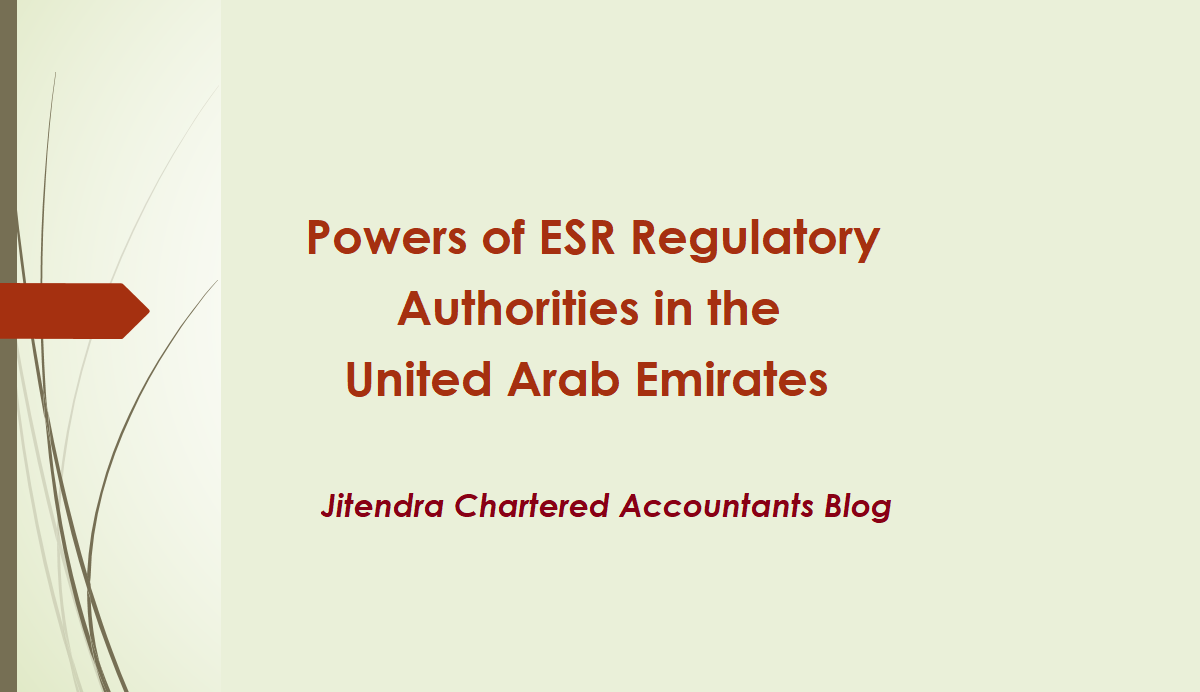The UAE government has issued Cabinet Resolution No. 58 of 2019 on 4 September 2019, which identified the Regulatory Authorities to oversee that the companies that conduct the Relevant Activities are maintaining adequate economic substance in the UAE. For the mainland companies, the Ministry of Economy is the Regulatory Authority and for the free zones, the respective free zone authority is the Regulatory Authority. The regulations set out various functions and powers to be carried out by each regulatory authority to discharge their duties.
The Regulatory Authority determines whether or not the Licensees meet the Economic Substance Test based on key requirements such as whether the companies are generating Core Income Generating Activities (CIGAs), being directed and managed in the UAE, and have adequate employees and physical assets. The Regulatory Authority is vested with powers to oversee that the Licensees are furnishing adequate documents/information. And take necessary actions including the exchange of information and penalties if the Licensee is not complying with the ESR.
Functions of the Regulatory Authorities for Economic Substance Regulation Purpose
1. Obtaining Licensee Records & Documents
The Regulatory Authority has the power to receive, hold, or store all the documents and information submitted by the Licensees as part of the ESR process. The Regulatory Authority ensures that the companies under its jurisdiction have submitted all the required documents in time and it will follow up with the Licensee if any document or records are pending for submission. The Authority can,
(a) Send a notice to the Licensee requesting additional information/ Documents
(b) Enter the premises of a Licensee under its jurisdiction to obtain the documents
(c) Impose penalties for failing to meet the test
2. Determine Whether the Licensee meets Economic Substance Test
The Regulatory Authority of a free zone, mainland or offshore companies is the competent authority that determines if the licensee if is meeting the Economic Substance Test in relation to each Relevant Activity it carries out in the UAE. The Authority uses the documents and information submitted by the Licensee to determine if the entity has passed the test in the corresponding Financial Year.
The Authority takes into account timesheets or any other evidence of relevance to assess whether the Licensee has an adequate number of employees with sufficient qualifications in the UAE. It will also consider the hours spent by various employees to conduct the CIGAs. This is necessary because the CIGA of a particular Licensee may vary during the course of a financial year and therefore the number of employees and other resources may not be constant.
The directors of the company may also conduct the CIGAs in addition to their core functions, which may reduce or eliminate the requirement for full-time employees. In such cases, the Regulatory Authority may ask the Licensee to submit evidence for CIGAs performed by the directors.
3. Action if Licensee Fails to Meet Economic Substance Test
If a Licensee fails to meet the Economic Substance Test, then the Regulatory Authority will issue a notice to the Licensee stating the causes for the failure and the penalty amount. It will also direct the Licensee to take necessary action to meet the test and reminds the entity of its right to appeal. An administrative penalty in the range of AED 50,000-300,000 will be imposed if the Licensee fails to meet the test.
4. Sharing of Information and Reporting Requirements
The Regulatory Authority will collect the information as part of the ESR notification submitted by the Licensee and also by way of requesting specific information from the entities. The Authority shares all the reports, documents, and information with the Ministry of Finance which is the Competent Authority for the ESR in the UAE.
5. Report Information to Foreign Competent Authority
The Regulatory Authority will inform the Competent Authority about every Licensee that failed to meet the Economic Substance Test with respect to the Relevant Activity. If the Licensee is a High-Risk IP Business, then the Regulatory Authority will share all the relevant information about the entity to the Competent Authority whether or not it met the test. The Competent Authority, in turn, shares the information about the Licensee with the Overseas Competent Authority if the entity fails the test or is a High-Risk IP Business.
How does Jitendra Chartered Accountants help with ESR Compliance?
Ensuring compliance with the UAE Economic Substance Regulations by meeting the Economic Substance Test has become a necessity for the Licensees. Failing to meet the test will incur administrative penalties and actions such as the exchange of information with the Competent Authority. Also, to ensure compliance the Licensees need to submit sufficient documents and will be required to send additional documents to the Regulatory Authority on demand. The Regulatory Authority has the power to retain the documents and can even enter the premises of the entities to get the documents/information they want.
To avoid such penalties and actions the companies require the professional assistance of reputed ESR consultants in Dubai, UAE like Jitendra Chartered Accountants (JCA). JCA assist the companies by
- Assessing how the Licensee can meet the ESR test
- Recommend strategies and action plans if a Licensee fails to meet the ESR test
- Assist in preparing and filing annual ESR Return


